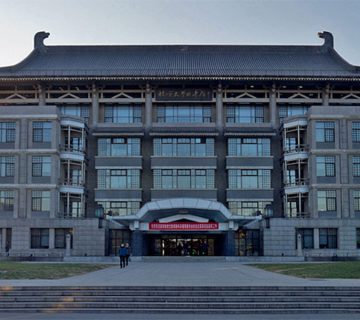Wuhan University of China is one of the nation’s oldest institutions, blending rich tradition with modern academic pursuits. Located on the picturesque banks of East Lake in Wuhan, Hubei Province, this state-funded research university has been a draw for scholars and intellectuals over centuries. Established in 1893 as Ziqiang Institute by visionary late Qing Dynasty governor Zhang Zhidong, it expanded by mergers and acquisitions, particularly in 2000 when it absorbed a series of prestigious academies. For international students interested in Wuhan University admission requirements, the process is structured but open, on merit and cultural tolerance. As China continues to open its borders even wider to global talent, having an idea of WHU university of China fees becomes critical for organizing a life-defining learning experience. This article from admission institute ventures into the multi-faceted arena of WHU University of China tuition fees, drawing insights from official university sources and authoritative global rankings. Whatever your field, whether you’re an entering undergraduate interested in engineering wonders or a PhD candidate interested in remote sensing, this guide is intended to enlighten your path.
Key Information about WHU
| Category | Details |
| Popular Majors | Buisiness administration, Remote Sensing, Law, Clinical Medicine, Biotechnology |
| Tuition Fees (Annual, Approx.) | Undergraduate: 200.000-25.000 RMB ($2.800-$3.500) English Taught, Master: 26.000-40.000 RMB ($2.600-$5.600), Doctoral: 30.000-35.000 RMB ($4.200-$4.900) |
| Living Costs (Annual, Approx.) | Accommodation: 1.200-6.000 RMB Meals: 12.000-18.000 RMB Total: ~20.000 RMB ($2.800) |
| Admission Requirements | Highschool Diploma (undergrads), relevant degree (grads), IELTS 6.0/ HSK 4, transcripts, recommendation letter |
| World Rankings (2026) | QS: #186 THE: 122 Shanghai Rankings: #101-150 |
| Scholarships | Chinese Governments scholarship, WHU presential Scholarships, Hubei Scholarship |
| Key Benefits | Research opportunities, UNESCO-recognizes campus, 95% employability, global alumni network |
Updated 10/27/2025

Wuhan University Majors
At the heart of Wuhan University’s appeal lies its extensive list of majors, spanning 10 general disciplinary areas: philosophy, economics, law, education, literature, history, science, engineering, medicine, and management. The sheer volume of options ensures that students can have their interests while receiving interdisciplinary education that speaks to the university’s emphasis on integrated education. Organized in more than 30 departments and schools, WHU programs are designed to cater to both basic undergraduate education and advanced graduate research with strong emphasis on practicality and innovation.
1. Undergraduate Programs
For undergraduates, it begins with strict four-year bachelor’s degrees with the purpose of building a well-grounded theoretical foundation accompanied by hands-on experience. Among the most highly coveted entry points are the School of Economics and Management, whose programs like Business Administration and Finance equip students with the tools of global markets. Envision yourself diving into case studies of China’s dynamic e-commerce or simulation studies of fiscal policy—these courses don’t just teach, but mold leaders. Similarly, the School of Law has a Bachelor of Laws which also broaches Chinese civil law and international treaties, drawing students interested in cross-border legal issues. Engineering students are drawn to the School of Remote Sensing and Information Engineering, a WHU specialty. In this school, Surveying and Mapping Engineering or Geographic Information Systems (GIS) majors operate high-tech labs for such initiatives as city planning with satellite images. Other notable undergraduate options are Chinese Language and Literature in the School of Literature, which bestows deep sophistication of culture, and Clinical Medicine at the School of Medicine, which blends in-school training with rotations through partner hospitals.
2. Graduate Programs
Wuhan University of china graduate studies continue this foundation with master’s and doctorate programs that are research- and specialization-oriented. The School of Economics and Management stand out with an MBA program that includes quantitative analysis and strategic management, typically to thesis on sustainable development in Asia. International Economic Law advanced studies are offered to law graduates, capitalizing on WHU’s cooperative links with international law firms. Engineering remains a special strength, PhD programs in Artificial Intelligence and Remote Sensing Technology leading the way—recent highlights include recent advances in environment monitoring drones. The natural sciences are not left behind, with the School of Mathematics and Statistics offering graduate majors in Applied Mathematics, enabling collaboration in big data analytics, and College of Life Sciences forays into Biotechnology, taking into consideration pandemic preparedness issues.
3. WHU Majors in detail
What makes WHU’s majors unique is their interdisciplinary flavor. For instance, the Hydrology program integrates engineering, environmental science, and data modeling in the handling of water resource problems in the Yangtze River Basin. English courses are available in fields like International Economics and Computer Science, which will be convenient for foreign students who wish to adapt more comfortably as foreigners. Admission statistics show steady growth in these disciplines, with over 3,000 overseas students annually choosing WHU and its blend of tradition and innovative coursework. Admission into these subjects is based on competitive entry exams and thorough reviews, and therefore preparation should be initiated a long time in advance.
4. WHUs Educational Facilities
Beyond the classrooms, Wuhan University of china majors emphasize hands-on learning. Field trips to the nearby Three Gorges Dam for civil engineering students or internships at Wuhan’s technology parks for computer science students bring theory and practice together. Research clusters guided by a faculty with many members of China’s top academies lead to publications in top-ranked journals. As one graduate recollected in a university journal, “Studying surveying at WHU was not just about maps; it was about charting my fate in the networked world.” With such abundance, WHU’s programs not only fulfill scholarship goals but also ignite life-long passions.

Cost of Studying in China
Beginning studies at Wuhan University of China means discovering the cost of college education in the Middle Kingdom, where quality is affordable. China study remains highly competitively priced compared to Western options, typically 20,000 to 60,000 RMB (around $2,800 to $8,400 USD) annually just for fees, based on the standard of program and language of study. The low entry point, along with liberal scholarships, makes China an economically wise choice for international students. Official estimates on sites like CUCAS, a well-known service endorsed by Chinese universities, emphasize the following fact: a full bachelor’s degree can be obtained for under $30,000 USD in four years, including living expenses.
1. Tuition Fees
Allocated, tuition is charged by type at WHU. Bachelor’s degrees taught in Chinese for undergraduate studies cost 3,500 to 4,500 RMB a year for sciences and humanities, up to 4,500 to 5,000 RMB for engineering and medicine. English-language programs, preferred by internationals, are slightly more expensive—25,000 RMB per year in fields like Business Administration or International Trade. Master’s programs are also split: Chinese-language programs are 26,000 to 30,000 RMB per year, and English-language variations, such as the MBA, are 30,000 to 40,000 RMB. Ph.D. students have moderately priced rates, at 30,000 to 35,000 RMB per year in most fields. These figures, sourced from WHU’s international admissions website, are 2025 figures and exclude special tracks like MBBS which can reach as high as 40,000 RMB because of their clinical nature.
2. Accommodation Fees
Another cost is accommodation, but WHU’s own campus dormitories make it relatively cheap. International student halls offer single, double, or quadruple rooms at 1,200 to 6,000 RMB per annum depending on facilities like air-conditioning and private bathrooms. Dwelling off campus in the bustling Luojia Hill community of Wuhan may cost 800 to 1,500 RMB monthly for a shared apartment, yet university dormitories facilitate friendships and availability. Mealtimes are a steal—cafeterias serve nutritious staples for 10 to 20 RMB per meal, which equals 1,000 to 1,500 RMB monthly. Transportation via Wuhan’s new metro system is under 200 RMB a month, and other incidentals like books (500 RMB/year) and entertainment make up modest 2,000 RMB annually. Healthcare and insurance are not optional, with mandatory coverage of 800 RMB per year under the Comprehensive Insurance & Protection Program for Foreigners to Study in China. The policy, which is administered by WHU’s International Education Institute, covers hospital stay and emergencies and is a source of reassurance. The cost of visas, about 400 RMB for the X1/X2 student visa, and the one-time residence permit fee (500 RMB) are early challenges, offset by no application fees for most programs.
3. Scholarships
Scholarships really help a lot, with WHU offering the Chinese Government Scholarship (full scholarship with tuition fee, 2,500-3,500 RMB monthly stipend, and housing) for best choices. The university Presidential Scholarship covers complete tuition up to 100% for high scorers, while provincial scholarships in China like the Hubei Scholarship offer 10,000-30,000 RMB annually. Through OECD-benefited programs in institutions like Xiamen University, over 40% of international students in China benefit from some financial assistance, so net tuition is even lower. China has other expenses, by CUCAS data, which include cultural experience—take a weekend trip to the Yellow Crane Tower for 100 RMB—without being a pricey endeavor. In essence, the cost of studying in China at WHU is a high-reward investment. A thrifty student devoting 50,000 RMB ($7,000 USD) per year can thrive, less than half of the $40,000+ averages in the US or UK. As global mobility expands, these numbers affirm China’s role as an education democratizer where being thrifty does not come at the expense of quality.

Wuhan University World Rankings
Wuhan University’s climb in international rankings reflects China’s own rise to prominence on the global scene, solidifying its position as a force in Asian higher education.
1. World Rankings
In the 2026 QS World University Rankings, WHU ranks #186 globally, a steady increase from #194 in 2025 and a remarkable jump from #335 in 2015. This is reflective of the university’s ongoing investments in research performance and worldwide orientation, with QS evaluators highlighting its score for employer reputation—94.8 out of 100—and testifying to alumni success in industry giants like Huawei and public service. THE World University Rankings 2026 places WHU at =122nd globally, an astounding feat among over 2,000 institutions ranked based on teaching, research environment, citations, international outlook, and industry income.
2. Subject Rankings
Measure highs: a student-faculty ratio of 13.5:1 ensures personalized attention, and 6% international student enrollment offers diverse input. WHU leads in subject rankings, with Physical Sciences (#101-125 in THE) and Engineering (#76-100) topped by remote sensing and hydrology innovations. Life Sciences and Medicine also perform well at #101-125, backed by connections to top hospitals. These rankings are not subjective; they reflect actual outcomes. WHU boasts over 300 national key disciplines and publishes 10,000+ research papers a year, with citations equivalent to Ivy League equivalents. In the Academic Ranking of World Universities (Shanghai Jiao Tong), it ranks #101-150 globally, topping 50 in Library and Information Management and Remote Sensing. Domestically, WHU is #5 in China by QS, which speaks volumes about its edge in a hyper-competitive market.
For prospective students, these rankings translate into improved career opportunities—graduates enjoy 95% placement rates six months on, in most instances, multinational corporations. As rankings evolve with elements like sustainability (WHU scores well on green campus initiatives), the global presence of the university expands, with more cross-cultural interaction. In a world where reputation gets one invited to the right club; rankings demonstrate that it is no longer just a Chinese jewel but a global contender.
Advantages of Studying at Wuhan University
Choosing Wuhan University of China unleashes a richness of benefits that extend well beyond degrees, linking personal growth with professional achievement.
1. Unique Campus
Everything revolves around the breathtaking campus—a UNESCO-listed marvel of architecture where historic pavilions are set amidst flowering cherry blossoms and state-of-the-art laboratories, all set against a serene backdrop of inspiration. This environment, dubbed the “Most Beautiful University in China,” promotes wellness; students often start days with tai chi by the lake or evening jogs along serpentine paths, blending mental acuity with physical vitality. “The WHU campus feels like living in a garden,” says Amina, a Pakistani PhD student.
2. Academic Perfection
Academically, WHU’s advantages are revealed through unprecedented access to research. With 106 ministerial key labs and joint ventures with NASA on satellite technology, undergrads contribute to projects early—co-authoring research papers on AI-infused climate models. Faculty mentorship is close-quarters, with thesis advisors guiding work that culminates in patents; recent instances include student-initiated pharmacophore biosynthesis breakthroughs, published in Nature Chemistry. For graduates, this yields competitive advantages: 70% go on to earn PhDs at global such as MIT, supported by WHU’s strong recommendation networks.

3. International atmosphere
International students enjoy tailored attention, from orientation to alleviate culture shock and to the International Students Union organizing festivals combining Hubei hotpot with home fare. Language issues? English majors and open HSK courses make transition smooth, with buddy programs pairing newbies with locals for on-the-ground views. Financially, scholarships are abundant, covering 80% of fees for the majority, allowing focus on studies rather than anxiety.
4.Guaranteed Employment
Professionally, WHU’s graduate pool of CEOs, diplomats, and Nobel laureates has internships at firms like Alibaba in neighboring Shenzhen. The university’s sports excellence, with Olympic medalists on the fencing team, instills resolve; clubs prepare one to get the job done in a team, a key leadership skill. Culturally, Wuhan’s “River City” culture offers Yangtze cruises and street food safaris, extending global citizenship.
Ultimately, education at WHU builds not only ability but character—resilience from challenging seminars, empathy from global dorms, imagination from collaborative labs. “WHU didn’t just teach me; it made me a global thinker with Eastern philosophy,” said one exchange student. In an age of globalization, these benefits make WHU a hub for meaningful lives.
Conclusion
Wuhan University of china is the ideal combination of academic rigor, cultural immersion, and affordability, and a popular choice to study in Wuhan universities among overseas students. From engineering to medicine, with a variety of majors that accommodate every interest, affordable WHU university of China tuition fees, and excellent scholarships, WHU maintains openness alongside excellence. Its highest global rankings, e.g., #186 in QS 2026, bear witness to research and employability focus, and its vibrant campus fosters self-improvement. Meeting Wuhan University admission criteria provides entry into an experience-transforming adventure, equipping its graduates to compete in a globalized world based on China’s rich heritage. If you are interested to study in one of the best universities of China, contact us for expertise consult.
1. What are the primary Wuhan University admission requirements for international students?
International students should possess a high school diploma (for undergraduates) or an equivalent degree (for master studies), English or Chinese proficiency (e.g., IELTS 6.0 or HSK Level 4), and a completed application with transcripts, letters of recommendation, and a personal statement. Some programs require entrance examinations or interviews. Details are given on WHU’s official international admissions website.
2. What is the tuition fee for WHU University of China English-taught programs?
English-taught undergraduate programs are around 25,000 RMB ($3,500 USD) annually, and master’s programs are between 30,000–40,000 RMB ($4,200–$5,600 USD). Doctoral programs are roughly 30,000–35,000 RMB per year. Scholarships can bring these amounts down significantly.
3. Why is it beneficial to study at Wuhan University of China?
WHU provides a top-class education with exposure to cutting-edge research, a UNESCO-accredited campus, and an international alumni base. Students enjoy affordable living, exposure to culture, and employment opportunities with high employability, supported by personalized mentorship and diverse extracurricular experiences.





No comment